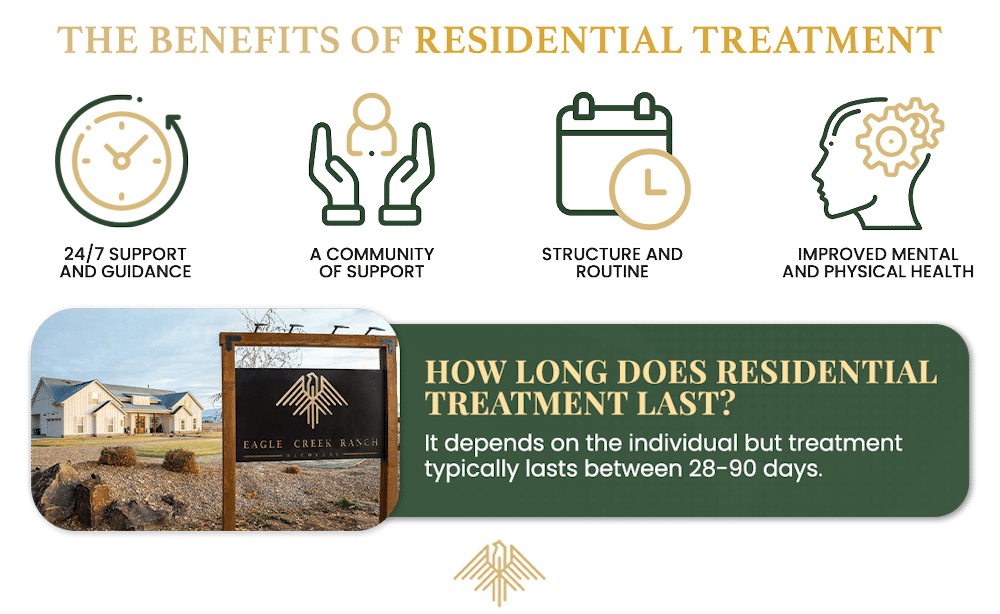Residential Treatment Program in Idaho
If you or a loved one is struggling with addiction, our residential treatment center in Nampa, Idaho can help. We offer individualized treatment plans that are designed to meet a person’s unique needs with behavioral health conditions such as addiction and mental health issues.
Inpatient treatment is a good option for those who have tried other methods of care, such as outpatient care but have not been able to overcome addiction. During a residential treatment program, you’ll live at the facility and receive around-the-clock care from addiction specialists. You will participate in various types of therapy to help understand alcohol or drug abuse, how it has specifically affected you, and how you can address your specific triggers.
Each care plan is crafted specifically for the individual so that we offer them the most thorough form of care. Every individual has a unique story regarding who they are, and their struggle with addiction.
Our tailored program at our residential treatment center reflects that story. Eagle Creek Ranch Recovery’s drug rehab in Idaho is here to develop an individualized treatment plan and help you or a loved one stay on a path of recovery.

A residential treatment program is a level of care that provides 24-hour support for those struggling with addiction. At Eagle Creek Ranch Recovery, we offer treatment programs that last 30, 60, or 90 days. During your stay, you will receive individualized care from our experienced staff.
This form of addiction treatment has proven to be very successful and boasts the lowest relapse rates for those in recovery. Residential treatment centers are often recommended for those struggling with severe addiction issues such as long-standing addiction or addiction to substances like alcohol or heroin. However, this treatment can be for anyone who needs to be removed from their living situation to fully heal from substance abuse.
Where Do Residential Treatment Programs Fit Into the Full Continuum of Care?
Residential treatment is typically the next step in the continuum of care after detoxification. Detoxification is often done on an inpatient basis to effectively manage withdrawal symptoms and monitor the patient’s well-being. After detox, residential care is often recommended to receive the most thorough form of addiction treatment.
Contact Eagle Creek Ranch Recovery
Today!
Why Wait? Find The Help You Need By Reaching Out To Us Today! Our Admissions Team Is Standing By.
What Can You Expect At a Residential Treatment Center in Idaho?
Residential treatment is a structured form of care that typically lasts anywhere from 28 days to 90 days. You’ll live at our facility and receive around-the-clock behavioral healthcare from our experienced staff.
You’ll participate in group therapy, individual therapy, and other types of counseling as well as have the opportunity to take part in other forms of holistic treatment. At Eagle Creek Ranch Recovery we offer a comprehensive form of addiction treatment that includes our outdoor adventure therapy. We firmly believe that substance use therapy should go beyond the four walls of a standard therapy setting to improve an individual’s recovery for their mind and body. Wilderness programs such as ours help heal the physical and spiritual aspects of substance abuse.
At our residential treatment center in Boise, ID, you’ll experience a unique form of recovery that will awaken your senses and love for life!
What Types of Therapy Are in a Residential Treatment Center?
The types of therapy you will experience during inpatient treatment will depend on the program you choose. However, all residential programs will include some form of individual and group therapy, as well as, family therapy. In these therapy sessions, residents will learn effective life skills to improve one’s severe behavioral health and mental health problems.
During individual therapy for addiction, you will meet with a therapist to discuss your addiction and any other co-occurring disorders you may be struggling with such as depression, an eating disorder, or personality disorders. Individual therapy also offers two techniques that can help you restructure the way you think and behave. These help you prevent future addictive behaviors and avoid relapse.
In a residential treatment center, people can attend group therapy sessions. Substance abuse group therapy is another important component in residential drug and alcohol abuse treatment. This type of therapy offers you the opportunity to share your experiences and feelings with others who are going through similar struggles.
This type of treatment also teaches how to learn and practice recovery techniques, develop interpersonal skills, and reinforce and expand their social support networks. It usually consists of a group of six to twelve people who meet regularly with one or two group therapists. The power of mutual-support groups, the possibility for cost reduction, and their efficiency in delivering psychoeducation while teaching coping skills to many persons at once have all contributed to the appeal of this style of therapy.
CBT for substance abuse helps you identify and change negative thinking patterns and behaviors that contribute to your addiction. This therapy is used in our mental health services to help cope with symptoms of drug and alcohol addiction.
DBT for addiction is a form of CBT that emphasizes teaching you skills to manage intense emotions, improve relationships, and cope with stressful situations. This is useful for anger management or preventing self-harm which may be a symptom of your drug or alcohol use.
Family therapy for addiction is an important part of residential treatment for alcohol and drug use. This type of therapy can help heal the damage that addiction has caused and resolve any family conflict. It can also help you learn how to communicate better, set boundaries, and resolve conflict.
In addition, therapy can help your family members understand your addiction and learn how to support your recovery.
The Benefits of Residential Treatment Centers

Residential treatment centers offer several advantages over other types of care including outpatient treatments. These advantages include:
At a residential treatment center, people will have around-the-clock access to care and support from medical professionals and other staff members. This can be especially beneficial if you have a severe addiction or need residential treatment for dual diagnosis. Inpatient care is very effective in addressing mental health and addiction struggles.
You’ll be able to meet and connect with other young people and adults who are going through similar experiences. Drug and alcohol abuse may often lead to social isolation, but group support can provide a sense of camaraderie that’s very helpful in recovery.
Residential treatment programs typically have a set schedule of activities and therapies. This can help you to stay on track with your recovery goals and continue to build on your current care plan. You’ll be able to monitor all of your progress and celebrate breakthroughs which may help with low self-esteem.
One of the main goals of residential treatment centers is to help you overcome your alcohol or drug addiction. You’ll work with a team of professionals to develop a comprehensive treatment plan that addresses all of your needs. This may include detox, therapy, and aftercare planning.
You’ll have the opportunity to focus on your overall health and wellness goals at our treatment facility. This includes behavioral health, mental health, improving nutrition, as well as being more physically active. Residential treatment centers over other treatment programs offered tap into someone’s emotional health and teach effective coping and life skills to prevent relapse.
Residential Addiction Treatment FAQs
The length of residential care can vary greatly depending on the individual. For some people, a 28-day program may be sufficient while others may need 90 days or more. The important thing is that you receive the treatment services you need to recover from your addiction.
The biggest difference between residential treatment centers and outpatient addiction treatment centers is that residential treatment requires you to live at the facility while receiving care. This allows you to be removed from any triggers or temptations that may lead to relapse. Additionally, residential programs usually offer more intensive treatment in forms of therapy and support than outpatient care.
The cost of treatment varies depending on the facility and the length of stay. Some insurance plans may cover the cost of care, but it is important to check with your insurance provider to see if they will cover residential treatment for addiction. If you have an employee assistance program (EAP), that can also help cover costs.
At Eagle Creek Ranch Recovery, we also accept some out-of-network providers, so your best bet is to speak with someone at our facility to help you understand all of your options.
There are a few things that you will want to look for when you are choosing a residential program for addiction.
The first is accreditation. You will want to make sure that the facility is accredited by a reputable organization such as the Joint Commission.
The second is licensing. The facility should be licensed by the state for the types of programs and therapies that they offer.
The third is insurance or forms of payment. You will want to make sure that the residential program accepts your insurance or is willing to work with you on the form and type of payment that you can offer.
We’re proud to fulfill each of these promises as we are dedicated to all our clients. Look no further than Eagle Creek Ranch Recovery for quality substance use disorder treatment in Idaho.

Choose Eagle Creek Ranch Recovery’s Residential Program
Choosing the right residential program is a vital step in ensuring your successful recovery from addiction. Eagle Creek’s residential treatment centers in Idaho offer a variety of unique therapy options to meet your needs and situation. Our medical staff has years of experience within the addiction treatment community and can offer you a wealth of knowledge regarding how to overcome addiction and mental health issues.
Our programs are accredited by the Joint Commission and licensed by the state of Idaho. We also accept most major insurance providers and will work with a variety of payment options. You or a loved one can get the help you need, and Eagle Creek Ranch Recovery can be the stepping stone to your new life in recovery. Contact us today!

Clinical Director
Kendall Maloof is the clinical director at Eagle Creek Ranch Recovery. She is a licensed marriage and family therapist and has held multiple leadership roles before settling here at Eagle Creek Ranch Recovery. Kendall received her master’s degree in marriage and family therapy from the Chicago School of Professional Psychology in 2016. Her career in mental and behavioral health began in 2014 when she took up internships in both the nonprofit and for profit sectors. She interned at multiple reputable companies, such as The Living Success Center and 449 Recovery in California.
In 2019, Kendall became the clinical director of Sunsets Recovery for Woman, a dual diagnosis program in southern California. Kendall is a natural leader. She has an incredible ability to problem solve and stay calm in any situation. Kendall never fails to show up when she is needed, and her calm demeanor makes her team and clients feel at ease. Eagle Creek Ranch Recovery is proud to have Kendall as our clinical director.


